Murder Mystery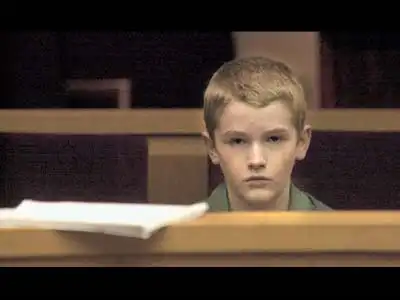 Speculations by Stefan Stenudd
It happened in Florida in November, 2001. Derek, the slightly older brother, smashed his sleeping father's head repeatedly with an aluminum baseball bat. His kid brother watched it. Then they set fire to the house and fled to the home of Rick Chavis, a 40 years old friend of their father, where they hid for a couple of days before turning themselves in to the police.
Tried as AdultsThe prosecutor decided that the boys should be tried as adults, which is deplorable in itself. How can they be tried as adults when they are not? That's an idea stemming from a vindictive society, taking pride in refusing to consider circumstances – as if crimes are committed out of malice alone, as if some people are evil from birth. As if compassion is perversion.But it got more complicated, once trial procedures started. The boys changed their story, now claiming that Rick Chavis had killed their father, in order to pursue his love affair with Alex, the youngest. Alex said that they had a sexual relation. Chavis had previous been convicted of child molestation.
Chavis was tried first, but the jury's verdict was kept secret until the trial of the boys had finished. It turned out he had been acquitted, whereas the boys were declared guilty to murder of the second degree. Later it was revealed that their jury believed the boys had been accessories to the murder, but that Chavis had been the one swinging the baseball bat. For this and other reasons, the judge wisely decided to throw out the conviction of the boys, calling the prosecutor's double trial “unusual and bizarre”. He ordered for mediation, in which the brothers admitted to third degree murder and were sentenced to 7 and 8 years. Chavis was acquitted from accusations of having had sex with Alex. Instead he was sentenced for hiding the boys for a couple of days after the murder and destroying evidence – washing the blood off their clothes. For that he got the maximum penalty, 35 years in prison. It's an absurd punishment for washing clothes, so it seems he was in fact punished for other crimes from which he had been acquitted, or plainly because he was a convicted child molester.
Why Is Still a MysteryThe circumstances around the murder remain confusing, although there's little doubt as to how the actual killing took place and the whodunit. Most of all, the why is still a mystery. Why would the boys kill their father, who seems not to have abused them?What appears most likely is that Alex feared that his father would stop him from pursuing his love affair with Chavis. Alex had confessed something of the sort, also claiming to have pushed his brother to the murder. But how could he have gotten his brother along on that?
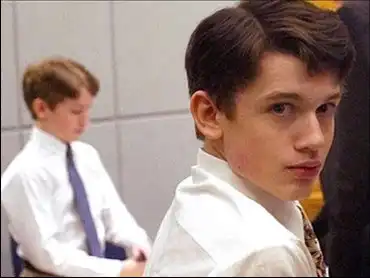 Alex and Derek King on trial.
Had their father been extremely abusive, it might have triggered Derek to defend himself and his brother, but not even the boys themselves claimed this. Instead, they both said that he was doing a decent job as a father, although in poor circumstances. Derek's foster parents regarded him as an increasing menace and wanted to send him to military school. But his father objected to that, which is why Derek was returned to him instead. Derek must have regarded this as a noble and loving fatherly intervention. Why would he in just seven weeks grow to hate the man enough to agree to kill him? This mystery seems not to have been investigated at any depth, neither in the trials nor after them. Maybe that was a consequence of the boys being tried as adults, so their psyches and motivations were of little interest. Only their deeds mattered and not what caused them.
Children Are Victims, ConstantlyI don't understand how this could have been neglected. When children commit a terrible crime there are always circumstances leading up to it, circumstances of which the children have very little control, if any. Simply put: when children are brutal it's because adult have been brutal to them.Adults are expected to be rational, even in moments of crisis. If abused, they should go to the police instead of taking revenge. They are supposed to control their desires, get over their disappointments, and so on. Very often adults do not. So, how can it be expected of children, who are yet to learn self discipline and to let their actions be ruled by the conscious mind? The world of children is different. They are helpless against the injustices and misfortunes of which they may be victims, since they have no say in the adult world. In a way, they are prisoners in it. Therefore, it cannot be expected of them to act rationally in straining situations. When they try, they are usually ignored by the adults around them, sometimes even punished for it.
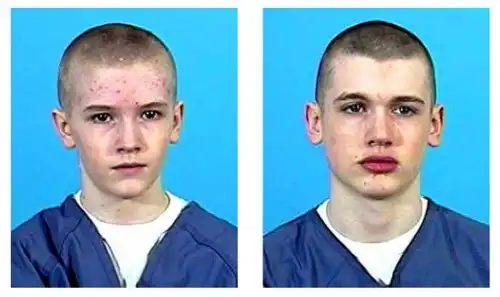 Mugshots of Alex and Derek King from their time in jail.
Instead, some people involved in the proceedings made smug remarks about the boys not seeming to take it seriously, not showing remorse, et cetera. Well, they were kids. Also, it's only in the movies that people cry when they are sad, laugh when they are happy, and shout when they are angry. In reality, the relation between emotion and expression is a complex one, often confusing both to the person in question and to others.
Not Much to GainIt's quite possible that Alex and Derek planned and committed the murder, because they calculated on somehow gaining from it. They thought they could go and live with Rick Chavis, once their father was out of the way. Then, Alex could continue his sexual relation with the man. Derek enjoyed the idea of living in a home with much less restrictions.
 Rick Chavis at his first trial.
Derek had no such interest in Chavis. Instead, he enjoyed the freedom Chavis allowed the boys – smoking weed, playing video games, watching big screen cable TV, and staying up late. Chavis obviously made sure that both the boys got what they wanted, so that he did, too. Nonetheless, these imagined gains would hardly have been enough for the boys to go ahead with the beastly murder, were they not scarred to begin with. Deliberately killing their father with a baseball bat – I doubt that any benefits would tempt them to it. Such desperate acts are rarely done in order to get something, but to get away from something.
Cracks on the Polished SurfaceIt's odd that the court didn't explore the possibility that the boys might have had something they really wanted to get away from. Not even their defense lawyers seem to have investigated the possibility, although there were several indications that there might have been something rotten in the state of Denmark, so to speak.For example, the boys never experienced an ideal home environment. Their mother left when they were very young, their father was struggling to make ends meet. He sent Derek to foster parents when the boy was around seven, and still had problems managing the home. Derek's foster parents gradually grew tired of him, returning him to his father seven weeks before the murder. Alex was seemingly well adjusted, participating in Pentecostal church activities, as did his father. But that's an environment far from perfect for a child who might nourish feelings of sexual ambiguity. After the trial, their paternal grandfather spoke to a reporter about his belief that the boys were guilty. He also mentioned meeting the boys when they were incarcerated during the trial, and they suddenly got very angry with each other, starting to fight so viciously that a guard had to break them up. At another moment, Derek mentioned to his grandfather that the church he went to was prejudiced, because they were against homosexuals. Derek asked his grandfather if he was, too. He replied that he was, adding: “It's dirty. It's filthy. The Bible is against it.” The grandfather, reverend of the Pentecostal church, then asked if Derek was a homosexual, to which he replied by throwing up his arms and saying: “No, I'm not.” Derek was obviously protective of his brother. But enough to kill, just to ascertain his brother's love life? Maybe, if their father had the same intolerant views as their grandfather did. The grandfather also suggested that there were additional problems in the family, such as a custody battle between Terry, the father, and their mother. Anyway, although they looked like two angels in the courtroom, Alex and Derek didn't have an easy life. This should have been examined in order for the trial to be fair.
The Court DramaWe know what Shakespeare said: “All the world's a stage, and all the men and women merely players.” That's true for everything we engage in, as soon as we are two or more to interact. Well, in some cases, we do it on our own. In childhood we learn about playing games. We never stop.It's certainly true for what happens in a court. It's a stage, where everybody is eager to show himself at his very best. The players all want to be believed, although they contradict each other. They use every trick in the book to seduce the audience, which is the twelve members of the jury – but also, nowadays, the media reporters present and through them the general public. Of course, nobody is more desperate to make a good impression than the one accused. They make sure to dress up and behave their very best. That was true also for the King boys, when they appeared at court on their own trial. Neatly dressed, with their hair combed as if for Sunday school. Defense lawyers not making sure of it would not have done their job. With Alex and Derek the effect was striking. They looked like two little angels worthy of occupying spots in a Leonardo da Vinci painting. Neither the jury nor the American audience watching them on Court TV could imagine such little darlings capable of striking their father's head repeatedly with a baseball bat. Probably, only Oscar Wilde would have expected it. But in the case of these two boys, no elaborate metamorphosis was called for. Vicious tongues compared their court appearances to their prison mug shots, claiming that the latter were truer representations of them – but who would look good on a mug shot? There are photos of them from before they were arrested, proving that they did indeed look as innocently sweet as creatures of Eden.
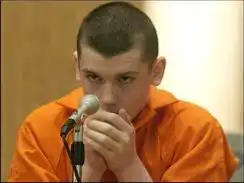 Derek King at their trial.
I'm not at all sure that it was to their advantage. At first, it was sure to gain them some sympathy, but through the proceedings they may have invoked a strange rage in many spectators – the indignation of beauty soiled, as if the boys were guilty because of their looks, instead of in spite of them. As if their sweet appearances were of devilish origin. Angels or demons, instead of just children. Spectators either adored or despised them. The trial became biblical.
In Their Own WordsOne of the terms of the mediation was that Alex and Derek King had to hand in two-page written confessions. Since the mediation was their last chance to avoid very long and severe prison sentences, and the content of their confessions made little difference, it's likely that they wrote those as truthfully as they were able. The documents can be found online.Derek's confession is typed. Its structure and language strongly suggest that his lawyer helped him with it. Alex made a handwritten confession, quite hard to read because of its many spelling errors and abbreviations. The confessions have one thing in common: they deal mainly with Rick Chavis and his actions.
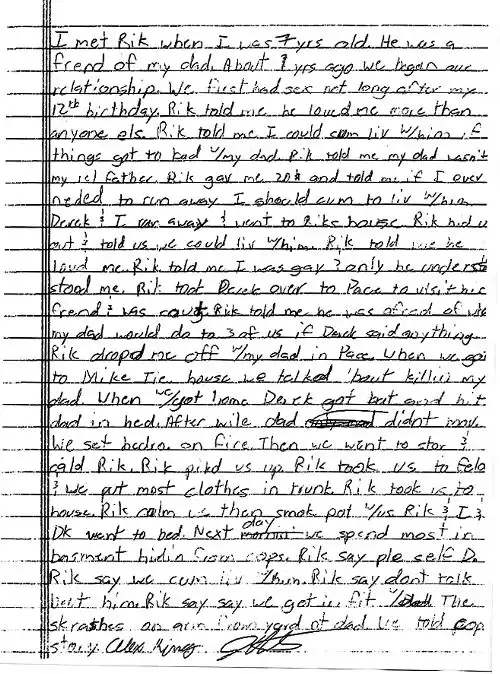 The first page of Alex King's confession.
The reason they got away with this in their confessions can only be that all those involved in the mediation really agreed with the boys about Chavis' role in the crime. About the actual murder, Derek only writes: “Alex suggested that I kill dad. I murdered my dad with an aluminum baseball bat. I set the house on fire from my dad's bedroom.” Alex elaborates minutely more on their crime (in his own spelling): “We talked 'bout killin my dad. When we got home Derek got bat and hit dad in hed. After wile dad didn't mov. We set bedro. on fire.” Alex's confession might not have sufficed like that, because there's an addition on a second page, separately signed: “I suggested that Derek kill my dad and that started a short talk about it. (I don't remember what exactly was said.)” These recounts are strangely sparse. Were they not made by children, one would get the impression of complete detachment, as if the brutal murder of their own father had no impact whatsoever on them. Except for the repeated blaming of Rick Chavis, there is no explanation to the deed. What is implied is that Chavis led the boys to it, by slandering their father (Alex even mentions that “Rik told me my dad wasn't my rel father.”) and offering his home as theirs – pointing out that their father would never accept it. “Rik told me he was afred of wte my dad would do to 3 of us if Derek said anything,” Alex writes in his confession. In his long list of accusations of Chavis, Derek states about him that he “Told us that dad would kill us before he would let us live with Rick.” Now, to make the two sons that afraid of their own father in such a short time period as was the case here, would hardly be possible if it were not somehow in line with their own impression of their father. If they feared him to begin with, and regarded him as prone to excessive violence in some situation, then they might be easily manipulated into exaggerating the threat. That could make them panic and act at the first opportunity, which the timeline shows is what they did.
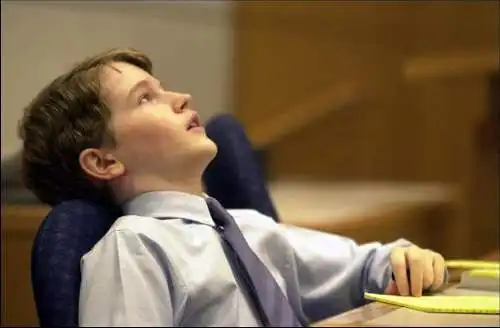 Alex King in court.
If so, they saw their father as the only obstruction to get a much better life, which would make them even more prone to believe that he would go to extremes to stop them. In the quick escalation of events, and Chavis feeding the fire, this could have made the boys desperate. Not that their confessions spell it out, but that's where a compelling motif can be found.
The Speedy Chain of EventsAlthough Alex got to know Rick Chavis already when he was seven years old, their relation started several years later – probably when the boy had grown to an age attractive to Chavis. Alex wrote in his cofession: “We first had sex not long after my 12th birthday.” He was born on July 12, 1989, so that would have been in the summer of 2001. No doubt, this changed everything.That summer was also when Terry moved to the house where he was later murdered. Only seven weeks before the murder, Derek joined the Terry King household, after spending more than six years with a foster family and having no contact with his blood relatives. That would be early October. The boys spent time in Rick Chavis' trailer home, now and then, until their father reacted and forbade them. He was probably not at all aware of what took place in Chavis' home, but he had become suspicious of the situation. On November 16, the boys ran away from home, hiding with Rick Chavis. Their father reported it to the police and struggled to find them. They stayed with Rick for more than a week, before Derek was found by the police on November 24. He was returned to his father. The next day, November 25, Chavis told Terry that he had “found” Alex. He was returned to his father in the evening. The boys pretended to have stayed in the woods. Terry and his boys spent the evening taking down the signs of the boys being missing that Terry had posted in the neighborhood. Sometime after midnight, they were back in the house. During that night, November 26, Terry was killed. A neighbor noticed the house on fire and called the fire department shortly before 1:30 AM, and at 1:37 the boys called Chavis, who quickly came and picked them up. Next day, November 27, Chavis drove Alex and Derek to the police station in the afternoon, where they surrendered themselves and confessed to the murder, but hiding Chavis' involvement completely. This escalation of events through little more than four months moves straight on to the climax of the night between the 25th and 26th of November. It's like the plot of a movie. It's even in accordance with Aristotle's ideas about the drama, expressed in his Poetics. What happens seems unavoidable, where one event leads mercilessly to next. Once Rick Chavis had made his relation with Alex a sexual one, the chain of events commenced and could not end in anything but tragedy.
Crime of PassionWhat emerges in this sad story is a crime of passion. There were overwhelmingly powerful emotions erupting in all the persons involved. Indeed like a tragedy of Ancient Greece.Chavis was probably at length unable to resist the temptation of the boy developing into something more and more desirable in his eyes. Alex was seduced and thought he had found love and a life of happiness, which he could not bear to let go once he had experienced it.
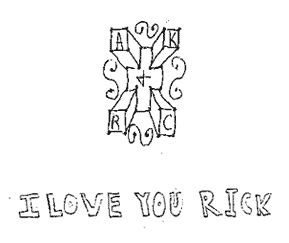 One of Alex King's notes about his love for Rick Chavis.
Derek entered about halfway into this boiling drama. He obviously took the side of Alex and Chavis against the father. Although not at ease about the relation between his brother and Chavis, he accepted it. Also, it was evident that he preferred staying with Chavis instead of at home. He had no doubt that Terry was a severe threat to the situation. Derek's role in the drama is still the most puzzling one. He had the least to gain and the least to lose, so how could he allow himself to be the very instrument of the murder? It can only be explained by immense affection for Alex. That affection was obviously mutual, since Alex later repeatedly insisted that he had urged his brother to commit the murder. Whatever love there might have been between Chavis and Alex, the brotherly love between Derek and Alex surpassed it. It grew quickly, since they only had seven weeks together before the crime. But that's a much longer time for children than it ever is for adults. Had they spent more time together, their mutual affection might even have worn down some, by the quarrels and fighting that's also common among brothers. Another necessary ingredient is the home their father offered them. He was strict, isolating them from any social life outside school. That can't be done to children growing up. He also lived an isolated life. In his efforts to make ends meet he must have struggled with a sense of personal failure. There is much about that home environment not told, out of respect for the murder victim. Also, the boys had been deserted repeatedly by their parents, who sent them to foster homes more than once. Especially Derek, who had only spent a few weeks with his father this time around, must have had little trust in any fatherly love or commitment. How could he know that he would not be sent away again, disposed like garbage? So, there we have it. Two boys living in what they would describe as a kind of prison, fighting for their freedom. One man offering that freedom, but really intended on using the boys for his own pleasure. Another man standing in the middle of this, like a fence. How could he be anything but the target?
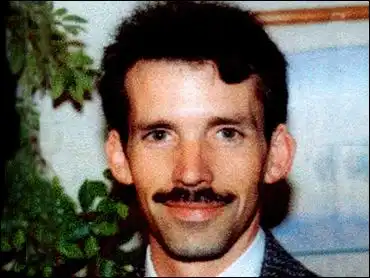 Terry King, father of Alex and Derek.
At the night of the murder, the climax of the drama, Terry must have made it clear to the boys that they would wake up to a very different situation, one they could not bear. Unaware of how much was really at stake for them, he made the mistake usually seen in action films – threatening with something horrible to happen later. It would have been enough if he just implied that drastic changes would come, for the imagination of the boys to run wild. Alex and Derek felt they couldn't afford to wait for it. So they acted on the same night. That's desperation. What followed was despair.
Judgment Is IrrelevantWe have this ugly tendency of jumping to the opportunity of judging the behavior and actions of others, although we rarely know all the circumstances. That reflex of ours is unbecoming. It's also irrelevant. Good and bad are inventions totally dependent on tradition and context. They rarely apply with any accuracy to specific situations.I guess that everybody would hurry to agree that Rick Chavis was the real villain in the above drama. The bad guy. Well, that's only true if he had chosen his sexual orientation out of free will and was able to restrain it, which is highly unlikely. Also, it requires that all the others would live happily ever after, if he had not interfered. That, too, is highly unlikely. The boys were deeply displeased with their family life and their father seems to have been miserable. That would lead to tragedy, be it of another kind. Some people commenting the case on the Internet have suggested that Alex was the evil force of the drama, manipulating his brother to the murder, just to pursue his own lustful desire. He has been described as a narcissist, which is almost categorizing him as a sociopath. That's jumping to conclusions about a boy his age, still in the process of growing up to be whatever. He may have been manipulated and mistaken about his true feelings for Rick Chavis, but it seems clear that at the time he was convinced of them. Although only twelve, he surely knew how his father, and most of the world, would react. If, for the first time in his life, he found satisfaction, what could he do but fight with every means for it? And Derek, who had been discarded again and again in his short life, struggling with what is described as ADHD and emerging rebellious behavior, how could he not jump at the opportunity of living in the tolerant environment he thought that Chavis was offering? Also, knowing about intolerance, how could he not jump as eagerly to the defense of his brother, whom he had found to be just as oppressed as he was? No, they all did what they could not refrain from doing. It could have been demanded of them to rise above themselves and overcome without submitting to violence, but we learn nothing about humankind if we just insist they should have. When I write a work of fiction, I have one basic principle about the characters of the story. I have to understand them all, I must be able to portray them so that they make some kind of sense. I have to feel that in a given situation, that could have been me. Otherwise I'm completely unable to have the story make any kind of sense. I think that every writer would agree. Honestly, in this sad story, the one I would have the most trouble portraying understandingly and sympathetically is Terry, the father of the boys. As I see it, he was unable to show his youngest son enough affection for the boy not to seek it in a predator, and he was unable to give Derek a sense of value and trust. On the other hand, it was a man deserted twice by the mother of his children, a man failing to provide even the basic necessities for a family. Also, he was probably a man entrapped by a religion without sympathy for his failures. It's possible to understand them all, without needing to excuse or defend them.
What a Story!Now, I look at the long text I've written about this terribly sad crime case. I had no idea I would, but I came across the story when surfing the Internet, and I got stuck. What a story!Let's turn to Shakespeare, again: “never was a story of more woe.” There are thousands upon thousands of such stories and they all deserve to be told. What strikes me with this one is how close to the formal structure of the drama it comes. Of course, that's not because reality imitates fiction, but the other way around. Human life is indeed one of stories, as if written in books. Some happy and some sad, comedy and tragedy. We all get both kinds in our lives. The proportions vary, though, and the world is not really fair. Some get comedy in abundance, others have their lives shadowed by immense tragedy, with few reasons to smile and none to laugh out loud. As a writer, I am addicted to telling this, again and again. I'm a parasite on the lives of others, real and imagined. The sad fate of Alex and Derek grabbed me, although I knew from the start that it's not the kind of story I would turn into a book. Still, this long text is on the verge of becoming one, so I have to round it up. Are there lessons to be learned from what happened to the King family? Certainly. Otherwise there would be no point in telling the story. Actually, if lessons would not emerge we just didn't pay enough attention to the story. I think that this story is primarily about tolerance. Like countless times before and since, adults treated children with insufficient care and still refused to be patient and sensitive to their reactions. The mother who left, only to return when her boys became famous, remained reluctant to face what they had become and why. The father who isolated them in his own hermitage refused to consider what it did to them. The man who lusted for them didn't care what he caused them. The court system didn't bother to see them for what they were and the situation they were in, but only considered their deed. Actually, the only innocent ones in this story were the children. Because they were victims with no real choice of their own. The Bible states that man was given free will. Well, that's still not true for children. Not that real free will and the power to act on it is any guarantee of children behaving exemplary. Adults don't, so children would probably not manage much better. But until they have this option they cannot be damned for their actions, no matter what they do. Whatever their own hands do, they are always in the hands of others.
AftermathAlex and Derek King have both ended their prison sentences, in 2008 and 2009. They made some talk show appearances and quickly reunited, though shortly. Since then, they struggle separately to continue with life in a regular manner. They are in their early twenties.
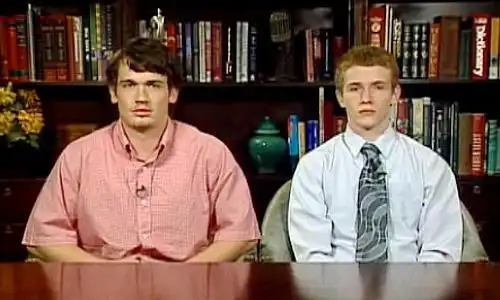 Derek and Alex King on a talkshow, after their release from prison.
When he was released, he joined an anti-violence campaign with Deepak Chopra, the New Age writer and spiritual adviser. That seems to have ceased. Kathryn Medico, who wrote a book about the case and acts like sort of a mother to Alex, introduced them. Derek has succeeded in living outside the news, except for a few TV appearances soon after his release. Both of the brothers study and try to find work, which is not easy for people with a criminal record. Their ordeal is far from over.
PSTwo books have been written about the Terry King murder: Angels of Death, 2003, by crime writer Gary C. King (no relation), and A Perversion of Justice, 2004, by the above mentioned Kathryn Medico and Mollye Barrows.I have not had the opportunity to read any one of them. Instead, I've used Internet sources. They exist in abundance, of course. Here's a good place to start: The murder of Terry King.
Stefan Stenudd June 27, 2011
More Speculations
About CookiesMy Other WebsitesCREATION MYTHSMyths in general and myths of creation in particular.
TAOISMThe wisdom of Taoism and the Tao Te Ching, its ancient source.
LIFE ENERGYAn encyclopedia of life energy concepts around the world.
QI ENERGY EXERCISESQi (also spelled chi or ki) explained, with exercises to increase it.
I CHINGThe ancient Chinese system of divination and free online reading.
TAROTTarot card meanings in divination and a free online spread.
ASTROLOGYThe complete horoscope chart and how to read it.
MY AMAZON PAGE
MY YOUTUBE AIKIDO
MY YOUTUBE ART
MY FACEBOOK
MY INSTAGRAM
STENUDD PÅ SVENSKA
|
 Sunday Brunch with the World Maker
Sunday Brunch with the World Maker